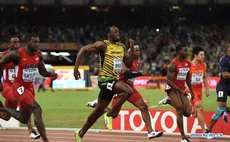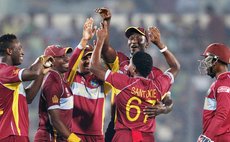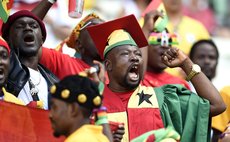An icon passes from the scene
Sir Frnnk Worrel must have seemed to many a throwback of the older days – a languid looking university professor, the type who didn't fail to be distinguished, dressed with the completion of his wardrobe in using his old school tie as a belt around an expanding middle. Of course, Sir Frank's cricketing wardrobe never leaned in this direction. An enlarged frame may be, but never digressing towards slovenliness. With him everything was kept in place. That was the exterior of the man when West Indies squared up against Australia for the first Test at Brisbane in 1961. What then of his Australian counterpart? I have heard it said Ritchie Benaud gave impression of a cultured country doctor. If this description fitted him, we can feel certain the personalities of those two men could not have posed greater balance to commence a series at a time when the game needed a lift to provide elevation in the public mind.
Ritchie Benaud died a few days ago, having served Australia as captain and leg spin bowling all-rounder, after which he became an established fixture as cricket's perennial face as television commentator. Benaud's passing saw him outliving Worrell by just about 48 years. Both men fell victim to cancer – Worrell succumbed to leukaemia. Benaud to skin problems at the age of 84. He is quoted as saying he never wore a cap during his career, something about which he later entertained misgivings with the onset of the condition, but simply acceded to as part of an occupational hazard.
We in the West Indies first became aware, painfully it must be said, of Benaud when he came on Australia's first visit to the Caribbean as member of Ian Johnson's side of 1955. The visitors' batting dominance expressed itself with totals progressing from 400 through 500, 600 and then 700, in which latter there was an overburden of five separate centuries in which Benaud featured with one of his rare attainments to three figures in Tests.
He was then only 25 and, of course, still rather impressionable and able to expand his judgment of opposing luminaries in the game. West Indies were crushed in essence by Australia. However, the wounds inflicted were unable to erase the significance of the redoubtable performance by another of the legendary three W's Clyde Walcott. The big Barbadian registered five centuries in the series inclusive of twice crafting separate centuries in a Test match.
Worrell did not play in that historic series, but evidence of Walcott's gigantic status with the bat must have been sufficient to give hint to Benaud of Worrell's oceanic stature as a younger man. When Worrell eventually accepted the messianic appointment of the captaincy there was no denying Benaud fully appraised the extent of his own workload if he were to measure up to the likely demands of the occasion. There has been the saying in summing up the extent of intransigence in a Titanic struggle: an irresistible force meeting an immovable object. Indeed, the first Test at Brisbane in 1961 gave rise to the first ever tied result in the lengthy catalogue of Test engagements. More still, the tied Test contained a hefty assemblage of players who were to feature in the transitional emergence of West Indies as a fully fledged dominant power in international cricket.
There was Sir Conrad Hunte, Rohan Kanhai, Sir Gary Sobers, Wes Hall, Lance Gibbs and the still potent Sonny Ramadhim and Alfred Valentine, spin twins of the storied period of the early fifties. In addition, there was Seymour Nurse, one of the most underestimated performers for West Indies with the bat. Then too, it should not be ignored that Gerry Alexander was continuing in the side under Worrell, having patriotically relinquished the captaincy to him.
That the Caribbean side under Denis Atkinson in 1955 was a far cry from that under Worrell in 1961, could not have escaped Benaud's consciousness. And then also his still embryonic sensibilities when in 1951 John Goddard's visit Down Under took place revealing excessive symptoms of underperformance, all that must have gone into the making of Ritchie Benaud the ultimate among incumbent Australian captains.
Accorded status granted to Worrell's side of 1961 to the extent that as many as half a million Australians turned up to bid farewell to him and his heroes from the Caribbean may have spoken volumes for the stature in which our cricketers were then held. Yet, it is difficult to isolate all this from the man Benaud! Certainly, much must have rested on the stamp of approval issuing from the captain of Australia as to the moments of grace defining in his utterances vocal and tacit.
Tenets of diplomacy and civility forbid undue emphasis on umpiring aberrations. The past is gone. But the cricketing public can be reluctant to sweep under the carpet an anomaly as severe as the outcome of a drawn result gained in the 4th Test which saw the final Australian pair surviving a few hours laden with appeals denied resolutely by Australian umpires.
Ritchie Benaud has stood witness to considerable changes in cricket, among them the introduction of neutral umpires and more recently the decision review system. For my part I will recall Benaud as a candid and dispassionately reliable commentator on myriad issues. It will take some time to adjust to commentary after Benaud. His easy reassuring manner would put everyone at ease, making complicated considerations simple. The country doctor has laid down his stethoscope. Undeniably, Ritchie Benaud aided in spreading the sport of cricket globally. He is quoted as saying captaincy is ninety percent luck and ten percent skill. During his tenure as commentator there could be no denying his captaincy skills continually surfaced in the manner he kept us entertained and edified.




